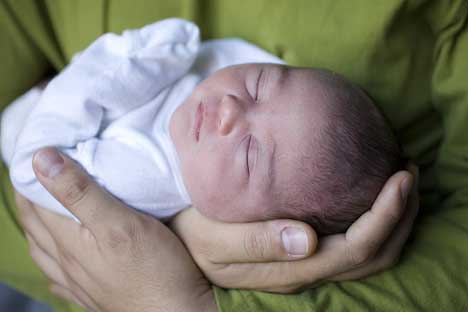
Photo credit: paul goyette
Being eco-friendly is not just about saving the planet, it’s about creating a healthy environment for yourself and your children. Having a baby is a great time to start over and as a time of new beginnings, the perfect time to bring some positive green steps into your lives.
1. Breastfeed for as long as possible
Breast milk is the most eco-friendly way to feed your baby. There are no additives, and no packaging. Breast milk is perfectly formulated by nature to give your baby the best start in life, protecting her against allergies and illnesses and providing the right nutrients at the right time.
To protect your clothes from leaky breasts in the early days of breastfeeding, opt for washable breast pads. They’re just as effective as disposable ones, but far more environmentally friendly.
If you absolutely cannot breastfeed your baby, consider buying glass bottles rather than plastic to avoid potentially harmful substances leaching from the plastic into the milk that you feed your baby.
2. Eat organic
Choosing organic produce is the best way to avoid chemicals, pesticides and GM foods. Eat organic yourself to keep your breast milk free of these substances, and when you wean your baby, be sure to buy organic for her too.
Get yourself a baby cookbook like the Organic Baby & Toddler Cookbook and make your own baby food with locally grown organic produce.
3. Choose reusable nappies
Fabric nappies are getting more and more popular with parents who are concerned about our environment. There are so many options available, some with poppers, some with Velcro, and you can choose from washable all-in-ones or prefolds which involve a fabric lining with a waterproof outer cover. They’re easy to machine wash, or you can use a nappy service.
If you have decided that reusable nappies are not for you, then consider opting for greener disposables like Moltex or Bambo.
4. Go for organic natural fibres
These days the choice is not just between synthetic and natural fibres, you can also choose organic baby clothes to further minimise your baby’s exposure to pesticides and chemicals, and to protect the environment and the workers who manufacture the products too. Natural fibres last longer, so offer used clothes to friends with younger children, or save them for your next child if you are planning to have any more.
5. Clean green
Choose natural shampoos, creams and toiletries for your baby and all the family. Look for products that contain no artificial fragrances and colours, mineral oils, parabens and SLS. Green products are kinder to your baby’s skin, kinder to the environment, and are usually not tested on animals.
6. Avoid pollution hazards
There’s pollution everywhere and it is impossible to protect your baby from it completely, but you can make an effort to minimise exposure. Instead of pushing your baby around in a pushchair right down with the exhaust fumes, carry her in a sling to keep her up and out of harms way.
7. Give up smoking
Subjecting your baby to second-hand smoke will put him at a higher risk of getting respiratory illnesses and allergies. And if you are breastfeeding you’ll be getting him addicted to nicotine too. Giving up smoking will be one of the most precious gifts that you can give your baby.
8. Reduce, reuse, recycle
Recycling is simple these days with councils making doorstep collections, and all you need to do is get organised enough to store your recycling between collections. If you aren’t provided with a wheelie bin by your local authority, pick yourself up some recycling sorters and teach your children how to recycle from a young age.
With children, there are lots of opportunities to reuse too, use cereal and egg boxes for craft projects, and yoghurt pots for painting.
9. Choose eco-friendly toys
Cut down on plastic making its way to landfill by limiting plastic toys and instead choosing more environmentally sound wooden toys for your child. Toys made of wood and other natural and sustainable materials like cotton and wool are also chemical and toxin free and so better for your baby than plastics that contain PVC and other chemicals. Other household objects make great toys too, like cardboard boxes, pots and pans, wooden spoons and sieves.
10. Be a good example
Walk the walk and your child will follow in your footsteps. Here are some ideas for inspiring your child to care for our planet:
- Choose reusable, recycled and biodegradable products wherever possible.
- Don’t waste paper. Bring home used paper from work for children to draw on the back of, and use both sides of paper yourself.
- Give you child’s unwanted clothes to a friend with younger children or to charity.
- Refuse unnecessary packaging in shops, and shop with your own shopping bags to avoid plastic bags.
- Donate your unwanted furniture to charity, or get rid of unwanted items on Freecycle.
- Only buy what you need, and always recycle what you can.